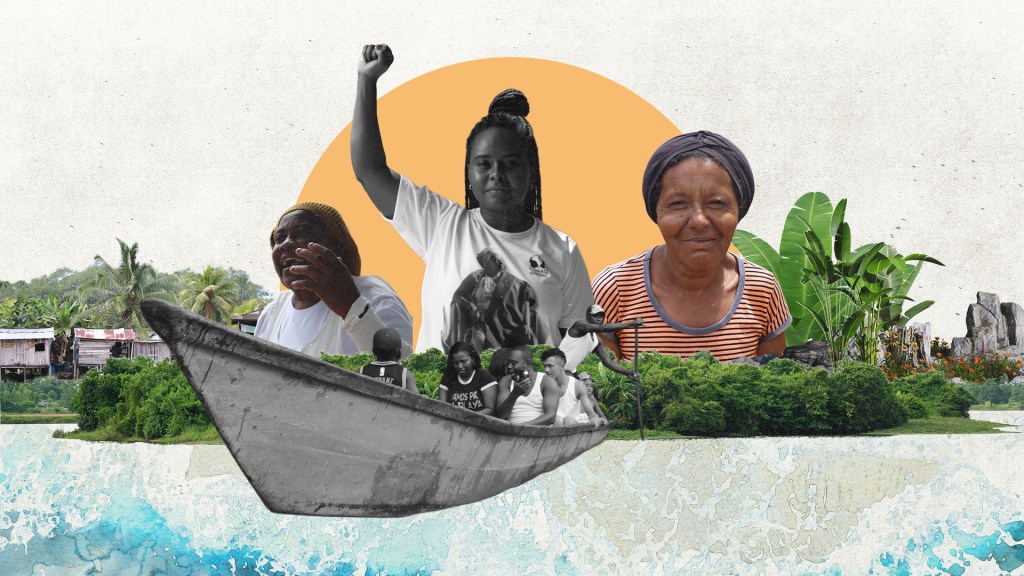
For many Afro-descendant peoples across Latin America and the Caribbean, the forest is synonymous with freedom. Under its canopies, their ancestors—10 to 12 million of whom were forcibly taken from Africa through the transatlantic slave trade—found refuge and a dignified life, safe from the horrors of slavery. Running away to densely forested areas allowed many of them to form communities that relied on nature as a source of protection, food, medicine, and livelihoods. The closer their relationship with nature, the better they were equipped to resist colonial forces: Some cooked at nightfall to prevent being seen, some made music that resembled the sounds of nature to avoid being heard–and this collective harmony with nature has stood the test of time.
Today, nearly one in four people in Latin America identify as Afro-descendant. In forest areas stretching from Brazil to Colombia to Ecuador, many are proud to have kept their traditions of land stewardship alive–and many are standing up to the legacy of systemic racism that has long invisibilized their culture, traditions, and long-standing practices that contribute to biodiversity conservation and climate mitigation.
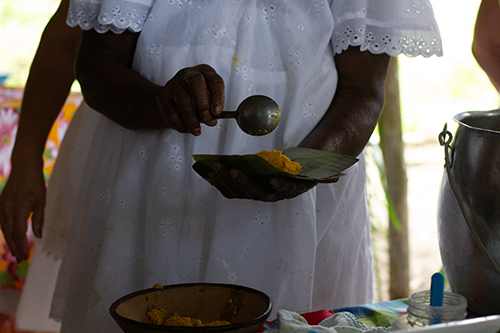
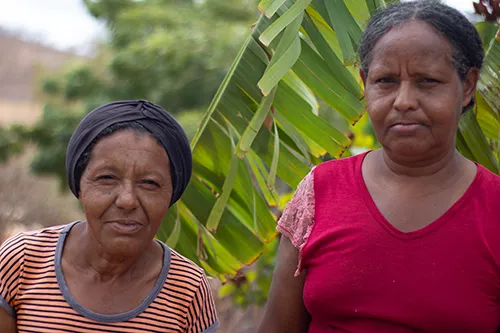
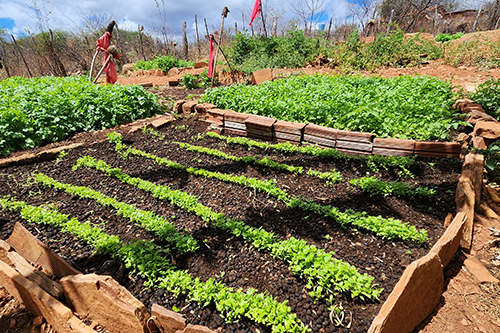
“It’s necessary to listen to nature and understand its timing,” said José Luís Rengifo, coordinator of territory and natural resources for the Processo de Comunidades Negras (PCN) in Colombia. “Knowing when to harvest, when to plant, when to fish. Never exploiting a single resource until it’s exhausted, but rather ensuring a balance of activities so that the biome sustains itself and remains rich and vibrant.”
It is this relationship with nature that keeps deforestation in Afro-descendant territories as much as 55% lower than the norm, according to recent peer-reviewed research. Many of their lands are also among the top 5% globally in biodiversity. “If the world breathes, it’s because we, who live here, make it breathe,” said Nubia de Souza, executive coordinator of the National Coordination of Articulation of Black Rural Quilombola Communities (CONAQ).
Transcript
Célia Cristina da Silva Pinto, a representative of Brazil’s Coordenação Nacional de Articulação das Comunidades Negras Rurais Quilombolas (CONAQ), explains why Afro-descendant communities having legal titles to their territories is essential for sustaining their live and livelihoods.
[Célia Cristina da Silva Pinto, a Black woman wearing a black blouse, dangly earrings, and glasses]
CÉLIA CRISTINA DA SILVA PINTO: We use itinerant agriculture, also known as small-scale farming. Still very traditional, and what we learned from our ancestors. The economic basis of my Quilombo is the cassava flour that we sell, and the rest of the products that we produce are for self-consumption. We produce rice, raise small animals, grow vegetables and fruit. It is essential to have the territories legally secured and titled to safeguard what we have been doing for centuries, which is the protection of these territories and safeguarding lives, not only our lives as human lives, but the lives that exist in our ecosystems in which we inhabit.
[The Ford Foundation logo is stacked in a bold black serif font, then transforms into a single letter “F” set inside a black circle.]
End of transcript.
Accessibility Statement
- All videos produced by the Ford Foundation since 2020 include captions and downloadable transcripts. For videos where visuals require additional understanding, we offer audio-described versions.
- We are continuing to make videos produced prior to 2020 accessible.
- Videos from third-party sources (those not produced by the Ford Foundation) may not have captions, accessible transcripts, or audio descriptions.
- To improve accessibility beyond our site, we’ve created a free video accessibility WordPress plug-in.
“It is essential to have our territories legally secured and titled to safeguard what we have been doing for centuries.”
Until recently, these significant contributions to climate mitigation and biodiversity conservation had largely gone unrecognized by the international community. Then, in 2024, after decades of collective organizing, research, and advocacy, territorial Afro-descendants and Quilombola communities, as they are called in Brazil, celebrated a milestone at the United Nations Biodiversity Conference (COP16) in Cali, Colombia. For the first time, global leaders reached a historic agreement that recognized these communities’ important role in nature conservation. It pledged to establish a body that would include Afro-descendants, Indigenous Peoples, and local communities in creating strategies to protect biodiversity—recognizing that their traditional knowledge and lived experiences are key to creating a more sustainable future for all.
Gaining this overdue recognition and visibility was the result of work led primarily by organizations including the PCN in Colombia and CONAQ in Brazil, along with groups from 16 countries that are part of the International Coalition of Territories and Afro-descendant Peoples in Latin America and the Caribbean (CITAFRO).
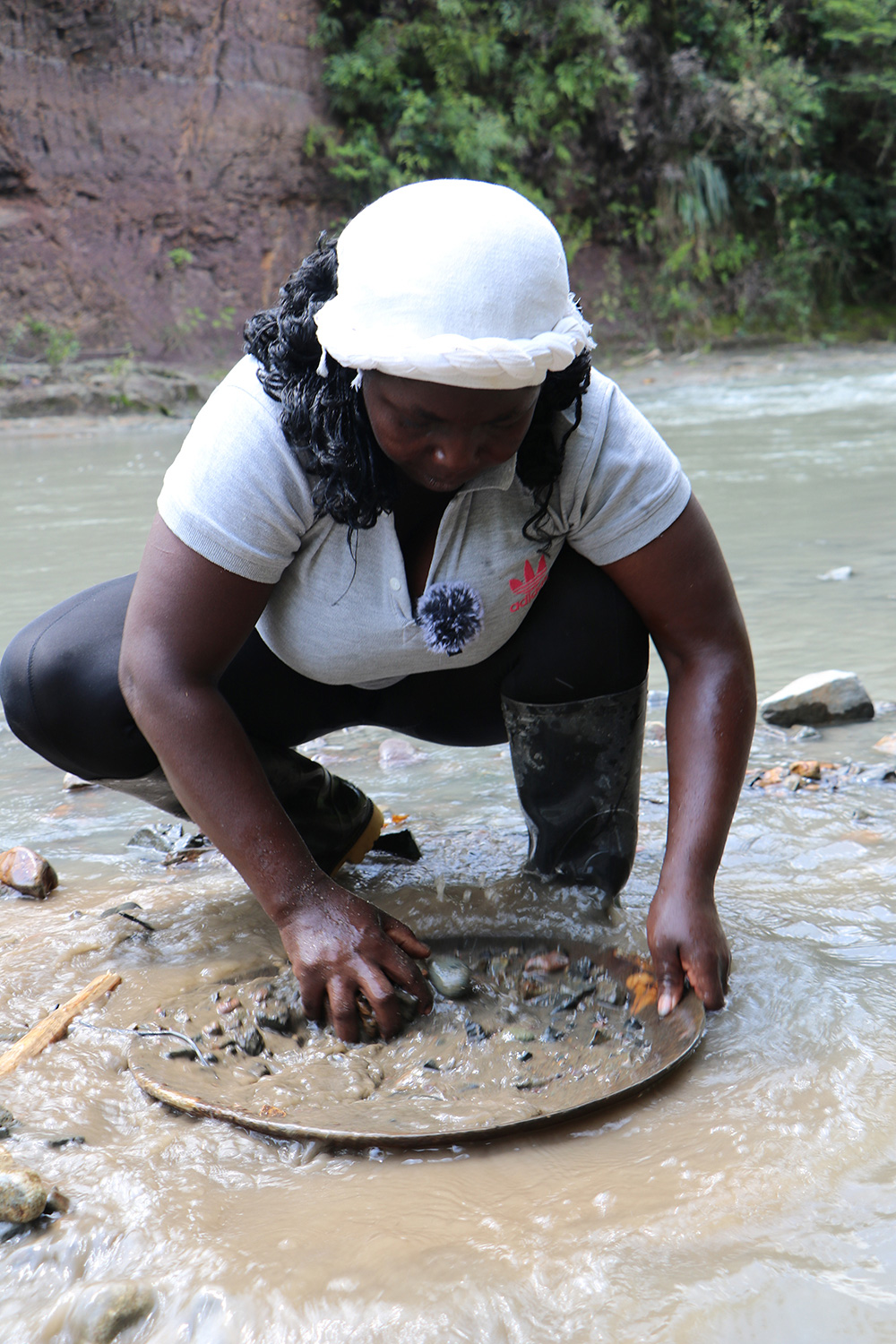
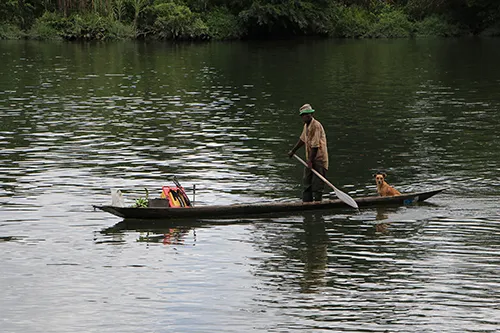
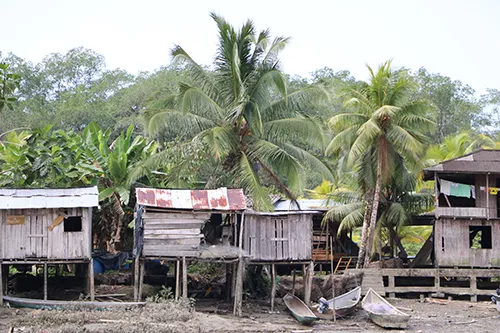
“The victory at COP16 was a fundamental first step, but now we must continue the fight,” said Sandra Andrade, one of the national coordinators of CONAQ. The term “Afro-descendant Peoples,” for instance, has yet to be formally included in international UN frameworks–which restricts community efforts to access climate finance and international legal protections. Ongoing advocacy is needed to ensure this initial recognition is translated into concrete actions that secure their rights in the face of increasing climate and social injustices. Now, communities are looking ahead to the UN Climate Change Conference (COP30) in November, the first to be held in the heart of the Amazon, to expand their visibility and seek greater support.
“We need to have an active voice in COP30,” said Rengifo. “We seek full recognition of Afro-descendants as a collective peoples, possessing specific rights and protections, in international UN frameworks. We seek flexible climate finance that meets the needs of our communities and legal rights to live in and manage our ancestral territories. We seek real participation in the decisions that affect our lives. We seek climate justice.” He added that securing these gains in global frameworks is essential to addressing the racial injustices Afro-descendant peoples have faced throughout history.
Transcript
José Luis Rengifo, coordinator of territory and natural resources for Colombia’s Proceso de Comunidades Negras (PCN), discusses Afro-descendant communities’ relationship with nature and the need for multilateral institutions to recognize their contributions to climate mitigation in order to achieve climate justice.
[José Luis Rengifo, a Black Afrocolombian man wearing a white shirt]
JOSÉ LUIS RENGIFO: Territory, for us, is not a physical space but rather a cultural space. We never engage in an activity that completely depletes a resource. That is why all these activities are both socially sustainable and economically viable, as well as environmentally sustainable to ensure that all these activities go on from one generation to the next.
Climate justice is about how, inside our territory, we defend and conserve; but we also need those who have contributed to its deterioration to help improve it. However, in multilateral institutions we are not recognized. It was only last year at the COP on biodiversity that Afro-descendant groups gained recognition. That is important because it gives visibility and also the ability to have legal arguments and tools for the protection of both natural resources and peoples at the international level.
[The Ford Foundation logo is stacked in a bold black serif font, then transforms into a single letter “F” set inside a black circle.]
End of transcript.
Accessibility Statement
- All videos produced by the Ford Foundation since 2020 include captions and downloadable transcripts. For videos where visuals require additional understanding, we offer audio-described versions.
- We are continuing to make videos produced prior to 2020 accessible.
- Videos from third-party sources (those not produced by the Ford Foundation) may not have captions, accessible transcripts, or audio descriptions.
- To improve accessibility beyond our site, we’ve created a free video accessibility WordPress plug-in.
“[Being recognized by multilateral bodies] gives us legal arguments and tools for the protection of both natural resources and peoples at the international level.”
Despite Afro-descendant communities’ generational presence on nearly 32.7 million hectares of rural lands, only about 24% of their collective territories have been formally recognized. Key legislation across the region, inspired by Colombia’s groundbreaking Law 70 of 1993, has created legal pathways to collective land titling, but enforcement of these laws remains inconsistent.
Without secure land tenure, communities face growing threats of displacement and violence from mining, illegal deforestation, and other extractive industries that operate on their lands without their consent. In Brazil, for example, 72% of people living in the impact zone of wind farms, a key component for the country’s energy transition, are Quilombola or Indigenous.
These threats compound existing inequalities experienced by Afro-descendant communities, who are already dealing with the impacts of climate change head-on. Some experts predict that the majority of these community territories could suffer temperature increases as high as 7°C/12.6°F.
“Living in these territories means constantly suffering from climate fluctuations: floods, droughts, and, in the case of coastal communities, the sea invading and ravaging the land,” said Rengifo.
Transcript
José Silvano Silva Santos, a representative of Brazil’s Coordenação Nacional de Articulação das Comunidades Negras Rurais Quilombolas (CONAQ), explains how climate change is impacting his community.
[José Silvano Silva, an Black man wearing a dark blue shirt]
JOSÉ SILVANO SILVA SANTOS: I am from the Quilombola community of Bacaba, in the municipality of Oriximiná, of the Amazon Rainforest. We originated from two slaves who inhabited our region there many, many years ago. People generally live off forest products that we harvest without harming nature.
We have recently had many problems with climate change, until now, there was no need to irrigate some plantations. And in the last two years, two extreme droughts dried up all the rivers. And, as our rivers are our streets, our roads, we are now left unable to move around. Without transportation, we now have a shortage of food, both in crops and in fish.
So we have had great difficulty in dealing with climate change. We know that if this discussion reaches an international level, I think it will be much easier to seek support, to seek financial resources to help the community live in a better way.
[The Ford Foundation logo is stacked in a bold black serif font, then transforms into a single letter “F” set inside a black circle.]
End of transcript.
Accessibility Statement
- All videos produced by the Ford Foundation since 2020 include captions and downloadable transcripts. For videos where visuals require additional understanding, we offer audio-described versions.
- We are continuing to make videos produced prior to 2020 accessible.
- Videos from third-party sources (those not produced by the Ford Foundation) may not have captions, accessible transcripts, or audio descriptions.
- To improve accessibility beyond our site, we’ve created a free video accessibility WordPress plug-in.
“In the last two years, two extreme droughts dried up all the rivers…and our rivers are our roads. Without transportation, we now have a shortage of crops and fish.”
“Last year, for example, we had a massive drought in the Amazon,” added de Souza. “Rivers that had never dried up before suffered, leaving populations isolated, without food, and in need. We see nature as a living body, whose limits must be respected, or it ceases to function. Just as our bodies give warnings when something is wrong, the environment does the same. We need to listen.”
De Souza lives in Brazil’s Amapá State, close to where COP30 will be held this year. She agrees that this synergy between Afro-descendants and nature is one of their communities’ defining characteristics, citing a local example in her quilombo: the careful harvesting and managing of açaí berries, one of the Amazon’s greatest natural resources. “We respect the moment when nature says it’s time to harvest. Large companies often don’t,” she said.
Transcript
Leidy Tatiana Ramos Angola, a representative of Colombia’s Proceso de Comunidades Negras (PCN), discusses her community’s African heritage, the role women play in sustaining life in their territories, and their collective relationship with nature.
[Leidy Tatiana Ramos Angola, a Black Afro-Colombian woman with long black hair, wearing a bright orange top and a gold necklace in the shape of Africa]
LEIDY TATIANA RAMOS ANGOLA: My Afro-Colombian territory has deep roots in African heritage, deep cultural roots. Well, the importance of women is huge—it’s fundamental.
In addition to giving life, we protect life, we extend life in all its forms. And in the territory, we take care of the land and the protection and strengthening of life itself. We also have a deep relationship with the territory. We grow the food, and we are an integral part of the land. The trees and everything else that makes up our territories are part of us.
We are not just what is seen—the individual—instead, the collective among people and what surrounds us are what is fundamental to our lives. We are the ones who know how to take care of the territory, we are the ones who know what should or should not be done to mitigate climate change, in order to lessen the impacts of climate change.
[The Ford Foundation logo is stacked in a bold black serif font, then transforms into a single letter “F” set inside a black circle.]
End of transcript.
Accessibility Statement
- All videos produced by the Ford Foundation since 2020 include captions and downloadable transcripts. For videos where visuals require additional understanding, we offer audio-described versions.
- We are continuing to make videos produced prior to 2020 accessible.
- Videos from third-party sources (those not produced by the Ford Foundation) may not have captions, accessible transcripts, or audio descriptions.
- To improve accessibility beyond our site, we’ve created a free video accessibility WordPress plug-in.
“We are the ones who know how to take care of the territory. We are the ones who know what should or should not be done to mitigate climate change.”
Recently, Brazil’s first minister of Indigenous Peoples, Sonia Guajajara, along with Anielle Franco, Brazil’s minister of racial equality, took measures to boost the representation of Afro-descendant communities at the conference. The ministers will be leading a People’s Circle, which promises to include Afro-descendant peoples in the negotiation tables, shaping the global decisions that will affect their lives and territories.
CITAFRO, the regional alliance of Afro-descendant and Quilombola organizations, is advocating for Latin American and Caribbean countries to include territorial protection for Afro-descendant communities in their official climate action plans, known as Nationally Determined Contributions. This would create greater discussion about specific measures these communities need to adapt to the changing climate and thus more fully center them in the conversation.
“These recent victories show that the decades of struggle were worth it,” said Andrade. “I hope future generations will continue building on these accomplishments and enjoy living in our territories with dignity.”
Related Grantees